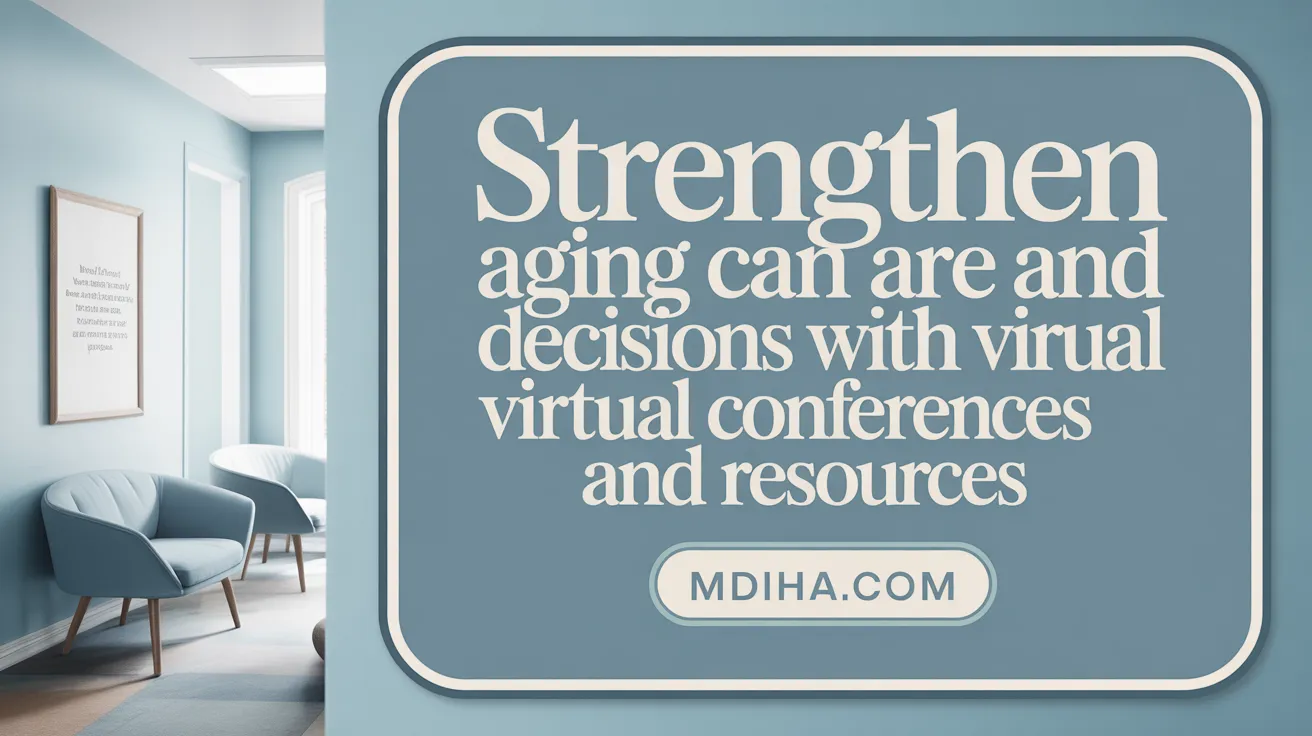The Digital Shift in Longevity Planning
As the quest for extended healthspan and lifespan gains momentum, virtual programs and digital environments emerge as transformative tools in longevity planning and progress. These innovative platforms leverage technology to personalize health interventions, enrich education, and foster social engagement, making the pursuit of healthy aging more accessible and effective than ever before. This article explores the multifaceted ways in which virtual initiatives empower individuals and communities to navigate aging with resilience and vitality.
Virtual Environments as Catalysts for Healthy Aging

What role do virtual programs and digital environments play in promoting healthy aging and longevity?
Virtual programs and digital environments are transforming how we support aging populations. They provide accessible platforms for education, social interactions, and health management, which are vital for maintaining quality of life as people grow older.
These digital tools enable remote health monitoring and personalized care, helping older adults stay active and cognitively engaged. For example, wearable devices and smartphone apps can track physical activity, monitor vital signs, and encourage mobility and exercise routines.
Virtual reality (VR) and immersive digital environments offer therapeutic benefits, such as stress reduction, improved mood, and cognitive stimulation. They create virtual spaces inspired by architecture, music, and art—like fractal and geometric art—that can promote mental well-being.
Moreover, digital health platforms can help overcome common barriers like transportation costs and physical access limitations. This ensures that underserved populations also benefit from preventive care and health education.
While evidence of effectiveness continues to grow, early results indicate that these technologies can support physical strength, balance, memory, and social connection. As digital literacy improves, and as interfaces become more user-friendly, virtual environments hold great promise for extending healthspan and fostering independence in aging.
Overall, integrating these virtual solutions into healthcare supports a more proactive, personalized, and inclusive approach to healthy aging, aligning with broader trends in Health 4.0 and the future of longevity-focused care.
Personalized Technology-Enabled Health Initiatives for Longevity

How do personalized, technology-enabled health initiatives contribute to longevity planning and health maintenance?
Personalized health programs harness a wide array of data sources, including genomics, wearable sensors, and environmental information, to develop targeted prevention and treatment approaches. This tailored strategy allows clinicians to understand an individual’s unique health profile and identify early signs of aging-related decline.
Real-time monitoring plays a crucial role by providing continuous feedback on physiological and behavioral metrics. This enables proactive interventions—such as adjusting lifestyle factors or initiating early therapy—before health issues become serious.
Advanced tools like biological age algorithms and biomarkers enhance the precision of aging assessments. When integrated into AI-driven platforms, these tools help visualize an individual’s aging trajectory and design personalized interventions, whether through diet, exercise, or emerging therapeutics like senolytics.
Continuous data collection and sophisticated analytics support healthcare providers in making well-informed decisions, leading to earlier diagnoses and optimized health management. Such proactive care strategies aim to extend not just lifespan but healthspan—the period of life spent in good health.
While challenges remain—such as ensuring data standardization and addressing ethical considerations—the rapid advancement of digital health tools and AI technologies has exponentially increased the potential for highly individualized longevity plans. These initiatives are transforming healthcare from reactive treatment to proactive, personalized longevity maintenance.
Innovative Virtual and Immersive Health Programs Empowering Longevity

How do innovative health promotion programs utilizing virtual and immersive technologies empower health management and enhance longevity?
Virtual reality (VR) and augmented reality (AR) are transforming health promotion by offering immersive environments that support physical, mental, and social well-being. These advanced tools engage users more deeply than traditional methods, encouraging consistent participation in wellness routines and rehabilitation.
VR and AR environments can simulate natural settings, calming music, and inspiring architecture, which help reduce stress and promote relaxation. Such experiences are linked to lowering inflammation and fostering mental states associated with increased lifespan. These technologies also facilitate cognitive engagement, mental exercises, and meditative practices that are essential in decelerating aging processes.
In the medical field, VR supports patient education, remote diagnostics, and even complex surgical procedures, improving safety and outcomes. For older adults, virtual environments that mimic social settings or nature can diminish feelings of loneliness and social anxiety. This social connectivity is critical for mental health and longevity.
Therapeutically, immersive programs can provide anti-inflammatory benefits and serve as adjuncts in treatments for chronic diseases. Personalized interventions based on multiomics data—integrated into virtual settings—allow tailored health plans for individuals seeking to extend healthspan.
Overall, these technologies offer accessible, engaging, and customizable options to promote healthy aging. They empower individuals to better manage their health in engaging environments, ultimately supporting longer, healthier lives.
Virtual Learning Platforms Advancing Longevity Strategies

How do virtual learning and educational initiatives improve aging well?
Virtual learning platforms are becoming essential tools for promoting healthy aging. They provide older adults with easy access to the latest scientific insights and practical skills related to health, wellness, and cognitive training. By offering flexible, user-friendly online courses, these platforms help individuals incorporate healthier behaviors, such as improved nutrition, physical activity, and stress management.
Moreover, engaging in continuous learning supports mental agility and emotional resilience, which are crucial for maintaining cognitive health as we age. Educational programs tailored for older populations often include age-friendly features—large text, simple navigation, and audio options—to ensure accessibility for everyone.
What are the cognitive and emotional benefits of virtual learning?
Participating in virtual courses stimulates brain activity, which can slow cognitive decline and reduce risks of dementia. Learners experience a sense of achievement and purpose, boosting emotional well-being. These programs also foster social interaction through discussion groups and virtual communities, decreasing feelings of loneliness and social isolation.
Furthermore, lifelong learning can enhance self-efficacy and confidence, encouraging a proactive attitude toward health management and life satisfaction.
What types of longevity-focused curricula and expert-led programs are available?
Many programs are designed specifically around longevity and healthy aging. They cover topics such as age-related health conditions, preventive care strategies, and mental health practices like mindfulness and meditation.
Expert-led virtual courses often feature top researchers, healthcare professionals, and caregivers who share insights and practical tools. For instance, some curricula incorporate aging science, personalized health planning, and resilience training, helping participants adopt lifestyle modifications that support a longer, healthier life.
| Program Type | Focus Area | Benefits | Delivery Method |
|---|---|---|---|
| AgeWell Online Courses | Cognitive training, health awareness | Reduces cognitive decline, promotes well-being | Interactive webinars, videos |
| Expert Workshops | Preventive medicine, lifestyle coaching | Empowers self-care, fosters community | Live sessions, Q&A |
| Community-Led Learning | Social engagement, support groups | Combats loneliness, encourages lifelong learning | Forums, virtual meetups |
Continued investment and innovation in these educational tools will support healthy aging and foster a vibrant, well-connected aging population.
Supporting Caregiving and Longevity Decision-Making Through Virtual Events

What is the significance of virtual conferences, workshops, and online resources in supporting longevity planning, caregiving, and aging-related decision making?
Virtual conferences, workshops, and digital resources have become vital tools in promoting effective aging and caregiving strategies. They offer accessible platforms that connect diverse stakeholders including healthcare professionals, caregivers, families, and aging individuals, regardless of geographic location.
By providing a space for knowledge exchange, these events foster collaboration across disciplines such as medicine, social work, and policy development. This integrated approach leads to more personalized and family-centered care planning, which is crucial for improving health outcomes and ensuring that services are well-coordinated.
Such virtual formats are also instrumental in delivering education and up-to-date information about new therapies, diagnostics, and best practices. For instance, webinars with continuing education (CE) credits equip caregivers and professionals with current skills and insights, enhancing their ability to support aging populations effectively.
Moreover, virtual technologies like telehealth and virtual reality expand access to healthcare services, especially for remote or underserved communities. They help reduce caregiver stress by providing timely support and resources, while also promoting social engagement and mental wellbeing.
Despite their many benefits, challenges such as technological barriers and privacy concerns must be carefully managed. Ensuring equitable access and ethical use of these tools is vital for maximizing their positive impact.
In summary, digital forums and resources are transforming aging care by enabling continuous education, fostering collaboration, and expanding access to vital health services, ultimately supporting healthier, more connected aging experiences.
Emerging Technologies and Market Trends Facilitating Healthy Longevity

How do emerging technologies, digital health platforms, and market trends facilitate longer, healthier lives?
Innovations like artificial intelligence (AI), the Internet of Things (IoT), blockchain, and advanced sensors are transforming healthcare by providing real-time health monitoring, early detection of diseases, and highly personalized treatment plans. These tools enable continuous assessment of health status, which supports proactive management and disease prevention.
Digital health platforms, including virtual clinics, telemedicine, and mobile health apps, extend healthcare access, especially for seniors and underserved communities. Smart home devices and wearable health trackers foster independent living by monitoring vital signs, movement, and environmental factors, reducing the need for frequent hospital visits.
Emerging fields such as regenerative medicine, bioprinting, and brain-computer interfaces hold promise for delaying aging and restoring lost functions. Therapies targeting cellular rejuvenation and organ regeneration are being developed, aiming to extend healthspan—the years of healthy, active living.
Market trends reflect rapid growth in these technologies' adoption. The AgeTech industry, for instance, is expanding, with over 300 startups in 2024 and an estimate of $2 trillion in market value by 2025. This shift fosters more accessible, efficient, and personalized healthcare worldwide.
However, the integration of these innovations also introduces challenges. Issues related to data privacy, security, interoperability, and ethical considerations are vital to address. Ensuring responsible use and safeguarding individual rights are crucial steps toward mainstream adoption.
By blending technological advances with systemic healthcare improvements, the future leans toward a world where longer, healthier lives become accessible to more people, driven by smarter, tailored medical solutions and proactive wellness strategies.
Integrating Virtual Programs into Comprehensive Longevity Ecosystems
How will the future of health and wealth services be collaborative?
As global populations age, a unified approach involving governments, healthcare providers, insurers, employers, and tech companies becomes essential. This collaboration aims to leverage platform-based technologies to share data seamlessly, create tailored health and financial solutions, and promote healthy aging. By integrating services across sectors, these partnerships can support comprehensive well-being initiatives, foster health equity, and enable personalized care strategies.
What are personalized concierge medical plans and how do they support longevity?
Personalized medical plans, such as the 12-month health concierge programs, use proactive and preventive care tailored to individual needs. These plans include detailed health assessments, advanced diagnostic testing, lifestyle coaching, and continuous monitoring through digital tools. They focus on addressing root causes of health issues, reducing medication reliance, and enabling early detection of diseases like cancer or cardiovascular problems, thereby extending healthspan and improving quality of life.
How do community health models influence global longevity?
Community-based health interventions, like door-to-door services in Mali or maternal health programs in Bangladesh, have significantly increased life expectancy in various regions. These models emphasize accessible, affordable, and preventive care, ensuring early signs of illness are detected and managed promptly. Digital health tools further expand reach, especially in underserved areas, offering preventive services and health education to foster healthier populations worldwide.
| Aspect | Details | Impact |
|---|---|---|
| Collaboration | Governments, insurers, tech companies partnering | Improved resource sharing and tailored solutions |
| Personalized Care | AI-driven diagnostics, ongoing health monitoring | Increased longevity and reduced disease burden |
| Community Models | Local health initiatives and digital outreach | Extended life expectancy, especially in developing regions |
The integration of virtual health programs within wider societal and community frameworks aims to enhance both lifespan and healthspan, driving healthier, more productive aging across the globe.
Digital Empowerment as the Foundation for Longevity
Virtual programs and digital environments are reshaping the landscape of longevity planning and healthy aging by enabling personalized care, immersive health promotion, lifelong learning, and informed caregiving. These technologies foster greater accessibility, social connection, and proactive management of well-being, addressing challenges inherent in traditional healthcare. As emerging technologies and market trends converge within an integrated AgeTech ecosystem, the future points toward more inclusive, data-driven, and effective approaches to extend healthspan and quality of life. Embracing these virtual innovations is essential for individuals, caregivers, and professionals committed to empowering longevity progress in an increasingly digital world.
References
- Leveraging the Metaverse for Enhanced Longevity as a ...
- What's Next Longevity Business Academy
- the Health Guardian for Longevity Program Uses Mobile ...
- Optimal Health: Longevity and Vitality Program
- Longevity Virtual Conference 2025
- The convergence of health, wealth and longevity services
- Turning Lifespan into Healthspan: The Future of Longevity
- The Longevity Revolution Is Coming — Will It Include You?
